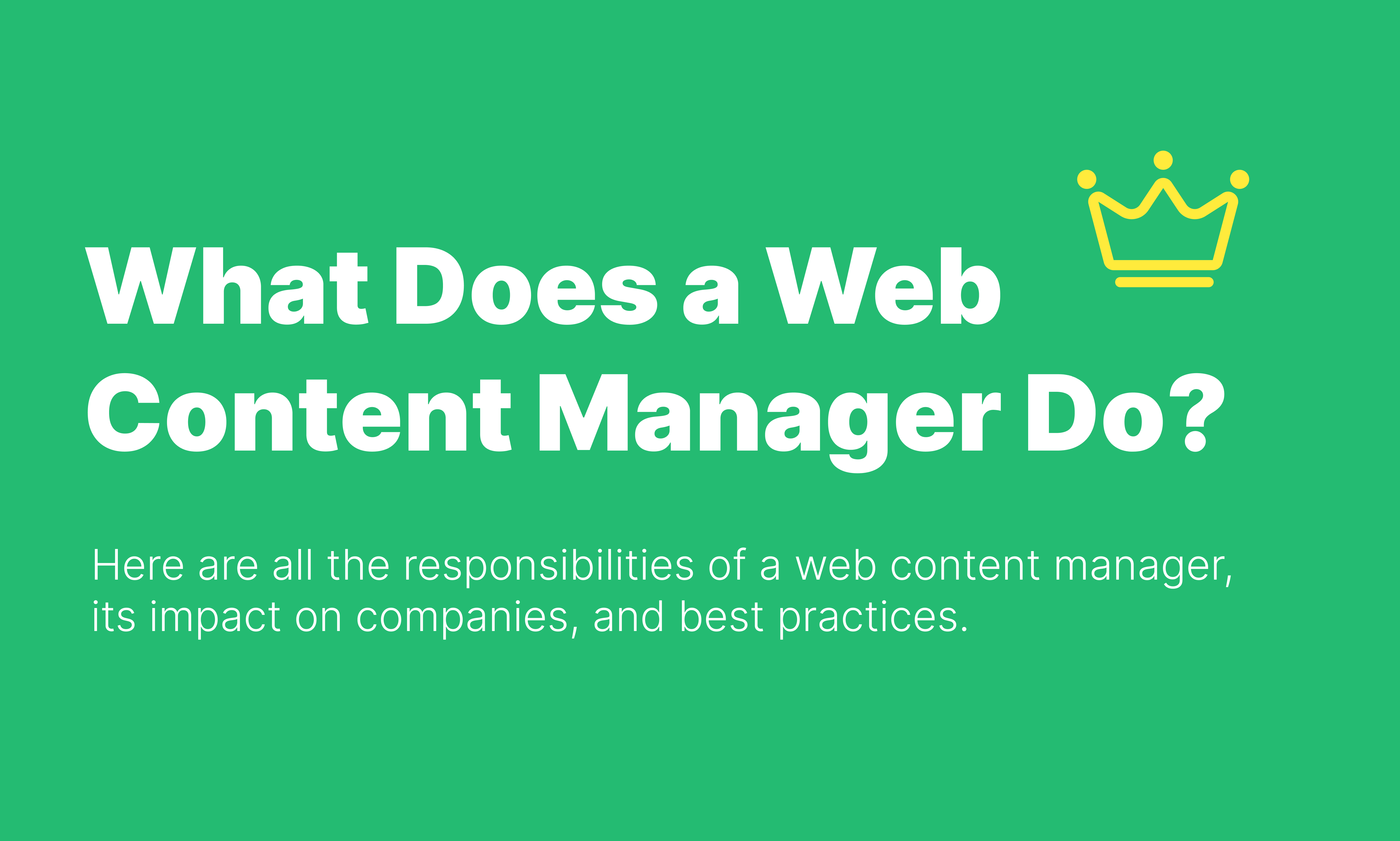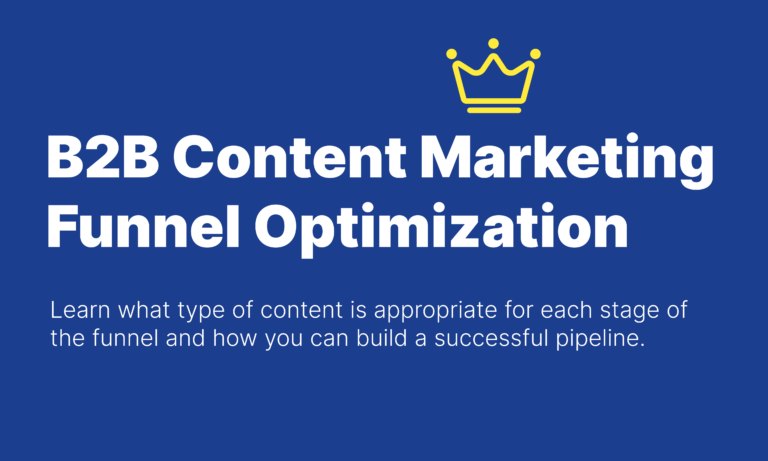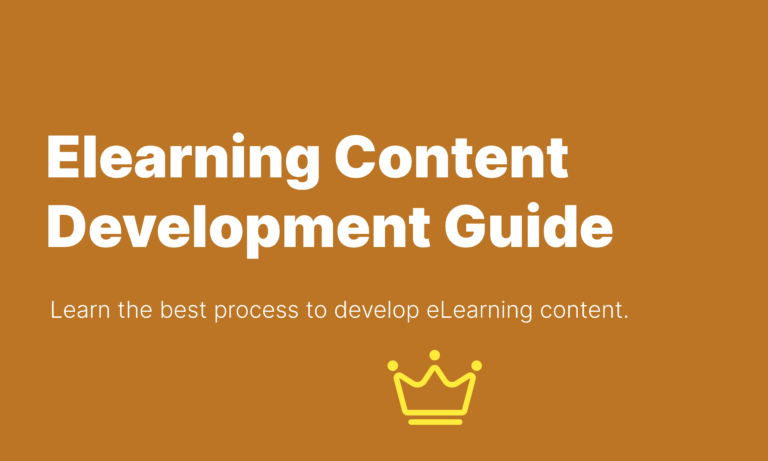What Does a Web Content Manager Do?

Web content managers and marketers are highly sought-after professionals who enable businesses to build strong lead pipelines through content. Here are all the responsibilities of a web content manager, its impact on companies, and best practices.
Key Takeaways
- Role of a Web Content Manager: Oversees content creation, management, and optimization for websites or online platforms.
- Responsibilities: Content strategy, creation, management, optimization, analytics.
- Skills: Technical (SEO, CMS, analytics), creative (writing, ideation), strategic (project management, collaboration, adaptability).
- Impact: Enhances brand awareness, drives traffic, generates leads, improves user experience, supports business goals.
- Best Practices: Define target audience, set clear goals, create a content calendar, prioritize quality, optimize for SEO, use analytics, collaborate effectively, and stay updated on industry trends.
What is a Web Content Manager?
A web content manager is a marketing professional responsible for overseeing the creation, management, and optimization of content for a website or online platform. They serve as the linchpin between business objectives and audience engagement, ensuring that the content produced is both valuable and effective.
Web content managers are strategic thinkers, problem solvers, and data-driven professionals who understand the importance of creating and delivering high-quality content that resonates with the target audience. They play a crucial role in driving online success by improving website visibility, generating leads, and enhancing user experience.

Signup for our newsletter
Enter your email below to get the best SaaS, AI, and Marketing insights in your inbox.
The Role of a Web Content Manager
A web content manager is responsible for overseeing the creation, management, and optimization of content for a website or online platform. This encompasses a wide range of tasks, including:
Content Strategy
At the heart of a web content manager’s role is the development and implementation of a comprehensive content strategy. This strategy serves as a roadmap, guiding the direction and focus of the content created. It involves:
- Target Audience Identification: Pinpointing the specific demographics, interests, and needs of the website’s visitors. This requires a deep understanding of the target audience’s pain points, desires, and preferences.
- Topic Generation: Researching and brainstorming relevant content ideas that resonate with the target audience and align with the brand’s messaging. This involves staying up-to-date with industry trends, competitor analysis, and customer feedback.
- Content Calendar Creation: Planning and scheduling content publication to maintain a consistent and engaging editorial calendar. A well-structured content calendar ensures a steady stream of fresh content and helps to optimize resource allocation.
Content Creation
Content creation is another critical aspect of a web content manager’s responsibilities. This involves commissioning, writing, or editing content that is both informative and engaging. Whether it’s blog posts, articles, product descriptions, or social media posts, the goal is to create content that resonates with the target audience and drives conversions.
Effective content creation requires a combination of creativity, technical skills, and a deep understanding of the target audience. Web content managers must be able to craft compelling narratives that capture attention, provide value, and align with the brand’s voice and messaging.

We can do your content marketing
Uphill Content specializes in growing tech businesses, from early-stage to exit. Send us a message to learn how we can help.
Content Management
Effective content management is essential for maintaining a well-organized and user-friendly website. Web content managers utilize content management systems (CMS) to organize, publish, and update content. They must manage workflows, ensure consistency, and maintain a high level of quality throughout the content lifecycle.
Content management involves various tasks, such as:
- Content Organization: Structuring content in a logical and accessible manner, using categories, tags, and other organizational tools.
- Content Publishing: Ensuring that content is published on time and accurately, following established guidelines and quality control procedures.
- Content Updates: Regularly updating and refreshing existing content to keep it relevant and engaging.
- Asset Management: Managing digital assets, such as images, videos, and documents, to ensure they are organized, accessible, and properly used.
Content Optimization
Content optimization is another key area of focus for web content managers. They must optimize content for search engines (SEO) to improve visibility and attract organic traffic. This involves conducting keyword research, implementing on-page optimization techniques, and building high-quality backlinks.
SEO is a complex and ever-evolving field, requiring a deep understanding of search engine algorithms and best practices. Web content managers must stay informed about the latest SEO trends and techniques to ensure that their content is optimized for maximum visibility.
Analytics and Measurement
Analytics and measurement are crucial for evaluating the effectiveness of content and making data-driven decisions. Web content managers use tools like Google Analytics to track website performance, analyze user behavior, and identify trends. By analyzing data, they can optimize content, improve user experience, and achieve business goals.
Key analytics metrics that web content managers should track include:
- Website traffic: Tracking the number of visitors to the website, their source, and their behavior on the site.
- Conversion rates: Measuring the effectiveness of content in driving desired actions, such as making a purchase or signing up for a newsletter.
- Engagement metrics: Tracking metrics such as time on site, bounce rate, and page views to understand how users interact with content.
- Social media metrics: Analyzing the performance of content on social media platforms to measure engagement and reach.

We can do your content marketing
Uphill Content specializes in growing tech businesses, from early-stage to exit. Send us a message to learn how we can help.
Key Skills and Responsibilities
To excel as a web content manager, one must possess a combination of technical, creative, and strategic skills. These skills are essential for effectively overseeing the creation, management, and optimization of content for a website or online platform.
Technical Skills of a Web Content Manager
- SEO Knowledge: A deep understanding of search engine optimization (SEO) principles is crucial for improving website visibility and attracting organic traffic. This includes keyword research, on-page optimization, and link building.
- Content Management System Proficiency: Expertise in using content management systems (CMS) is essential for efficiently creating, managing, and publishing content. Popular CMS platforms include WordPress, Drupal, and Joomla.
- Analytics Skills: The ability to interpret data and use analytics tools to measure content performance and make informed decisions is vital. This includes understanding key metrics such as website traffic, conversion rates, and engagement rates.
Creative Skills of a Web Content Manager
- Strong Writing and Editing Skills: The ability to write clear, concise, and engaging content that resonates with the target audience is essential. This includes writing blog posts, articles, product descriptions, and social media posts.
- Content Ideation: The ability to generate creative and original content ideas that align with the brand’s messaging and resonate with the target audience.
Strategic Skills of a Web Content Manager
- Project Management: The capacity to manage multiple projects simultaneously and meet deadlines is essential for effective content management. This includes planning, organizing, and prioritizing tasks to ensure timely completion.
- Collaboration: The skill to work effectively with a team of designers, developers, and other stakeholders is crucial for successful content creation and management. This involves effective communication, problem-solving, and teamwork.
- Adaptability: The ability to stay up-to-date with the latest trends and technologies in the digital landscape is essential for success. This includes staying informed about changes in search engine algorithms, social media platforms, and content marketing best practices.
The Impact of Web Content Managers
Web content managers play a pivotal role in the success of businesses and organizations. By creating, managing, and optimizing high-quality content, they can significantly impact a company’s online presence and bottom line.
Enhancing Brand Awareness
One of the primary benefits of effective web content management is increased brand awareness. By creating engaging and informative content, web content managers can help to establish their brand as a thought leader in their industry. This can lead to increased brand recognition, trust, and loyalty among target audiences.
Driving Organic Traffic
A well-executed content strategy can drive significant organic traffic to a website. By optimizing content for search engines (SEO), web content managers can ensure that their website appears prominently in search results for relevant keywords. This can lead to increased website visitors, which can ultimately drive conversions and sales.
Generating Leads and Conversions
High-quality content can be a powerful tool for generating leads and conversions. By providing valuable and persuasive content, web content managers can attract and engage potential customers, encouraging them to take desired actions, such as signing up for a newsletter, requesting a demo, or making a purchase.

We can do your content marketing
Uphill Content specializes in growing tech businesses, from early-stage to exit. Send us a message to learn how we can help.
Enhancing User Experience
A positive user experience is essential for driving customer satisfaction and loyalty. Web content managers can contribute to a positive user experience by creating content that is easy to understand, visually appealing, and relevant to the target audience. This can help to keep visitors engaged on the website and encourage them to return in the future.
Supporting Business Goals
Effective web content management can be a powerful tool for supporting business goals. By aligning content strategy with overall business objectives, web content managers can help to achieve desired outcomes, such as increasing sales, improving customer satisfaction, or building brand awareness.
Best Practices for Web Content Managers
Web content managers play a critical role in the success of a website or online platform. By following these best practices, they can ensure that their content is effective, engaging, and aligned with business objectives.
Content Strategy and Planning
Content strategy and planning are essential for the success of a website or online platform. By carefully defining the target audience, setting clear goals, and creating a well-structured content calendar, web content managers can ensure that their content is effective, engaging, and aligned with business objectives.
Defining the Target Audience
Understanding the target audience is fundamental to creating content that resonates. Web content managers should identify the specific demographics, interests, and needs of their target audience. This information can be gathered through market research, customer surveys, and analytics data.
Once the target audience is defined, web content managers can tailor their content to address their specific concerns, interests, and pain points. This can help to build stronger relationships with the audience and increase engagement.
Setting Clear Goals
Setting clear and measurable goals is essential for guiding the direction of content creation. These goals should align with the overall business objectives and be specific, measurable, achievable, relevant, and time-bound (SMART).
Examples of content goals include:
- Increasing website traffic
- Generating leads
- Improving customer engagement
- Enhancing brand awareness
- Driving sales
By setting clear goals, web content managers can focus their efforts on creating content that directly contributes to the achievement of these objectives.
Creating a Content Calendar
A content calendar is a valuable tool for web content managers to plan and scheduling content publication. It helps to ensure a consistent and engaging editorial calendar, prevents content gaps, and facilitates efficient resource allocation.
A content calendar typically includes:
- Content topics: A list of planned content ideas, including blog posts, articles, social media posts, and other forms of content.
- Publication dates: The scheduled dates for publishing each piece of content.
- Content formats: The planned format for each piece of content, such as blog post, infographic, or video.
- Assigned resources: The individuals or teams responsible for creating and publishing each piece of content.
Content Creation and Optimization
Content should be informative, engaging, and relevant to the target audience. It should also be optimized for search engines through keyword research, on-page optimization, and link building. Additionally, content should be designed for a positive user experience, making it easy to read, visually appealing, and mobile-friendly.
Content Management and Governance
A content management system (CMS) can be used to efficiently create, manage, and publish content. Clear guidelines for content style, tone, and formatting should be established to ensure consistency. A quality control process should also be implemented to review and approve content before publication.
Analytics and Measurement
Web content managers should track key metrics such as website traffic, conversion rates, and user behavior to measure content performance. Analytics tools can be used to understand how users interact with content and identify areas for improvement. Data-driven decisions can then be made to optimize content strategy and improve results.
Collaboration and Communication
Effective collaboration with other team members, such as designers and developers, is essential for ensuring that content aligns with overall business objectives. Open and transparent communication with stakeholders is also crucial to keep everyone informed and aligned.
Staying Up-to-Date
Web content managers should stay informed about the latest trends and best practices in web content management. This can be achieved by attending conferences, taking courses, or reading industry publications.
Web content managers use a variety of tools to streamline their workflows and improve their efficiency. Here are some of the most common tools:
Tools for Web Content Managers
- WordPress: The most popular CMS, offering a user-friendly interface and extensive customization options.
- Drupal: A powerful and flexible CMS suitable for large-scale websites and complex content management needs.
- Google Search Console: A free tool from Google that provides insights into website performance and search engine visibility.
- Ahrefs: A comprehensive SEO toolset for keyword research, backlink analysis, and competitor analysis.
- SEMrush: Another popular SEO tool offering a wide range of features, including keyword research, site audits, and competitor analysis.
- Hootsuite: A popular tool for managing multiple social media accounts from a single dashboard.
- Matomo: A popular open-source analytics tool that offers similar features to Google Analytics.
- Hotjar: A tool for recording user sessions and creating heatmaps to understand user behavior.
Summary of What Web Content Managers Do
A web content manager serves as the architect of a website’s digital narrative, crafting and curating content that resonates with audiences. This role requires a unique blend of creativity, technical skills, and strategic thinking.
Web content managers are responsible for developing and implementing a content strategy that aligns with business objectives, creating engaging content, managing content effectively, optimizing content for search engines, and analyzing content performance. Their efforts contribute to brand awareness, drive traffic, generate leads, enhance user experience, and ultimately support business goals.

Signup for our newsletter
Enter your email below to get the best SaaS, AI, and Marketing insights in your inbox.



